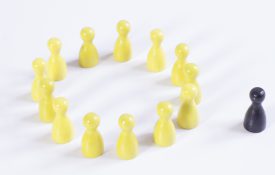-
Applicant’s race or gender doesn’t appear to influence NIH peer reviewers
An unusual experiment to test whether an applicant’s apparent race or gender influence how their grant proposal is scored has found no evidence of bias. The study, which involved re-evaluating proposals already funded by the National Institutes of Health (NIH) in Bethesda, Maryland, after the applicants’ names had been altered, is part of an ongoing effort by NIH officials to detect bias in their vaunted peer-review process. Some scientists who have read the NIH-funded study, described in a preprint posted online on 25 May, object to what they say is its implication that bias doesn’t exist. But the authors say they are making no such claim.
-

Science of Racism Examined in New Set of Research Articles
Psychological scientists describe research on the enduring and often hidden presence of racism at both the interpersonal and societal levels in the June issue of Current Directions in Psychological Science.
-
New Research From Psychological Science
Read about the latest research published in Psychological Science: A Cognitive-Ecological Explanation of Intergroup Biases Hans Alves, Alex Koch, and Christian Unkelbach People often evaluate minorities and out-groups negatively. These are usually novel groups and thus tend to be associated with unique attributes that differentiate them from other groups. But unique attributes are also more negative than positive because of their higher diversity and lower frequency. The authors propose a model that combines these two theories to explain the negative evaluation of minorities and out-groups.
-
The “marshmallow test” said patience was a key to success. A new replication tells us s’more.
Here’s some good news: Your fate cannot be determined solely by a test of your ability at age 5 to resist the temptation of one marshmallow for 15 minutes to get two marshmallows. This relieving bit of insight comes to us from a paper published recently in the journal Psychological Science that revisited one of the most famous studies in social science, known as “the marshmallow test.” The idea behind the new paper was to see if research from the late 1980s and early ’90s showing that a simple delay of gratification (eating a marshmallow) at ages 4 through 6 could predict future achievement in school and life could be replicated.
-
Let’s Stop Talking About The ’30 Million Word Gap’
Did you know that kids growing up in poverty hear 30 million fewer words by age 3? Chances are, if you're the type of person who reads a newspaper or listens to NPR, you've heard that statistic before. Since 1992, this finding has, with unusual power, shaped the way educators, parents and policymakers think about educating poor children. But did you know that the number comes from just one study, begun almost 40 years ago, with just 42 families? That some people argue it contained a built-in racial bias? Or that others, including the authors of a new study that calls itself a "failed replication," say it's just wrong?
-
Feeling disgust helps us stay healthy, study says
Disgust is our guardian: Though most of us would rather not feel this unpleasant emotion, it helps us avoid disease and infection, new research suggests. Long before microscopes revealed unseen germs and parasites, humans developed a system of disgust, with six basic triggers warning us to turn away from harmful pathogens, according to a study published Sunday in the journal Philosophical Transactions of the Royal Society. "Disgust evolved to protect us from disease in our ancient past.

